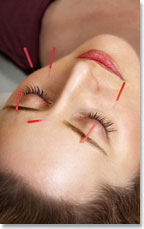 Modern medicine typically treats depression with a form of psychotherapy and/or anti-depressant drugs regardless of the specific symptoms presented. In the United States, the DSM-IV, a diagnostic tool for appropriately categorizing psychological disorders, is widely used in the diagnosis as well as the treatment for depression.
Modern medicine typically treats depression with a form of psychotherapy and/or anti-depressant drugs regardless of the specific symptoms presented. In the United States, the DSM-IV, a diagnostic tool for appropriately categorizing psychological disorders, is widely used in the diagnosis as well as the treatment for depression.
In contrast, Traditional Chinese Medicine (TCM) does not recognize depression as an illness per se, but aims to treat symptoms specific to the individual using a variety of techniques such as acupuncture, Chinese herbs, tui-na massage (acupressure), and energetic exercises in an effort to restore imbalances in the body.
Acupuncture is an ancient Chinese treatment based on the belief that energy flows through channels (meridians) throughout the body and that an imbalance of these energies constitutes illness. Acupuncturists insert needles into points located on meridians with the aim of correcting the imbalance and restoring health.
Case studies have indicated that acupuncture can help in the treatment of depression. Electroacupuncture, where electrical stimulant is applied to the needles, appears to have greater efficacy than traditional acupuncture. Two studies compared the effects of electroacupuncture and amitriptyline in depressed patients. In the first study, patients suffering from depression received 5 weeks of therapy with either electroacupuncture or the tricyclic antidepressant amitriptyline hydrochloride. A comparison of Hamilton Depression Scale scores before and after treatment showed a significant reduction in the scores for the electroacupuncture group.
The second study involved 241 depressed patients and compared treatment with electroacupuncture or amitriptyline hydrochloride for 6 weeks. Hamilton Depression Scale scores showed a significant reduction after treatment in both groups. Electro-acupuncture has been used in a variety of settings as an effective antidepressant drug therapy, without the unpleasant side effects associated with medication. A study at the University of Arizona in Tucson found acupuncture as effective as drug therapy and concluded that participants using acupuncture had significant reduction in depressive symptoms.